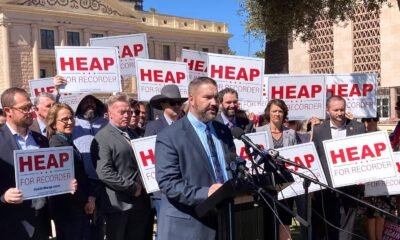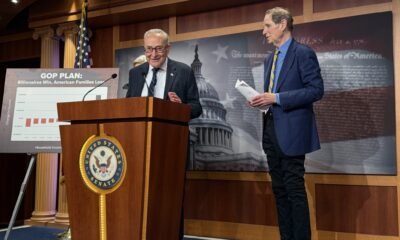DDD
Republicans and Gov. Hobbs at Odds in High-Stakes Disability Funding Showdown

Arizona’s Division of Developmental Disabilities is facing a significant crisis, requiring $122 million to maintain services through the end of the fiscal year on June 30. Without this funding, services for approximately 60,000 Arizonans will cease, creating urgent concerns for families relying on these critical resources.
In a bold political move, Governor Katie Hobbs announced on April 17 that she would veto any new legislation until lawmakers reach a bipartisan agreement to secure the necessary funding. This decision follows complaints from families who may lose access to essential care as funding dwindles.
Republican lawmakers had proposed a funding solution but faced stern rejection from Hobbs. She labeled their plan a “non-starter,” citing excessive restrictions that undermine her goals. The proposed measure would pull funding from other programs, including prescription drug rebates and the Housing Trust Fund.
Frustration erupted among GOP representatives, particularly from Rep. David Livingston, who chairs the House Appropriations Committee. He felt Hobbs was dismissing a viable solution while accusing her of political maneuvering that neglects the needs of those with developmental disabilities.
Livingston’s comments sparked additional controversy, leading to a rebuke from Rep. Nancy Gutierrez for violating decorum. This public conflict highlights the growing divide between the governor and Republican lawmakers, as compromises seem increasingly elusive.
In response to the standoff, supporters of increased funding have initiated recall drives against several Republican lawmakers, including Livingston. The petitions assert that these lawmakers fail to act in the best interests of their constituents, particularly regarding access to vital services for disabled individuals.
Gathering enough signatures for a recall election poses significant hurdles, given the tight deadlines and requirement of local support. Historically, successful recall efforts have been rare in Arizona, with the last notable example occurring in 2011.
As discussions progress, the looming deadline of May 1 adds pressure. The state’s ability to pay families for caring for disabled children hinges on securing the required funds. This program, initially funded by federal dollars during the pandemic, was extended at state expense when those funds were exhausted.
Many in the GOP accuse Hobbs of creating this funding crisis through her unapproved expansion of the Division of Developmental Disabilities program. Claims have been made that she failed to disclose the potential budget shortfall until well after it became a pressing issue.
While some Republican lawmakers are open to adjustments in funding strategies, significant resistance exists within the party. Amid internal conflicts, Livingston managed to consolidate votes to defeat alternative proposals that would have eased some restrictions.
The political friction has drawn comparisons to past administrations. Both Governor Jan Brewer and Doug Ducey previously employed similar veto threats to negotiate suitable budgets, successfully achieving their objectives despite considerable opposition.
Overall, the deadlock over funding for developmental disability services in Arizona underscores mounting tensions in state politics. With time running out, the fate of thousands hangs in the balance as both sides grapple with their priorities and the need for compromise.


















